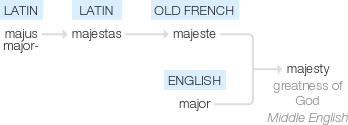Majesty
Middle English (in the sense ‘greatness of God’): from Old French majeste, from Latin majestas, from a variant of majus, major- (see major).
wiktionary
Middle English majeste, mageste, from Old French majesté, from Latin māiestās, ultimately derived from Proto-Indo-European *meǵh₂s(“great”). See mega-.
etymonline
majesty (n.)
c. 1300, mageste, "greatness or grandeur of exalted rank or character, imposing loftiness, stateliness, qualities appropriate to rulership," from Old French majeste "grandeur, nobility" (12c.), from Latin maiestatem (nominative maiestas) "greatness, dignity, elevation, honor, excellence," from stem of maior (neuter maius), comparative of magnus "great, large, big" (of size), "abundant" (of quantity), "great, considerable" (of value), "strong, powerful" (of force); of persons, "elder, aged," also, figuratively, "great, mighty, grand, important," from suffixed form of PIE root *meg- "great."
Earliest English use is with reference to God or Christ; as a title of address or dignity to kings and queens (late 14c.), it is from Romance languages and originated in the Roman Empire.
